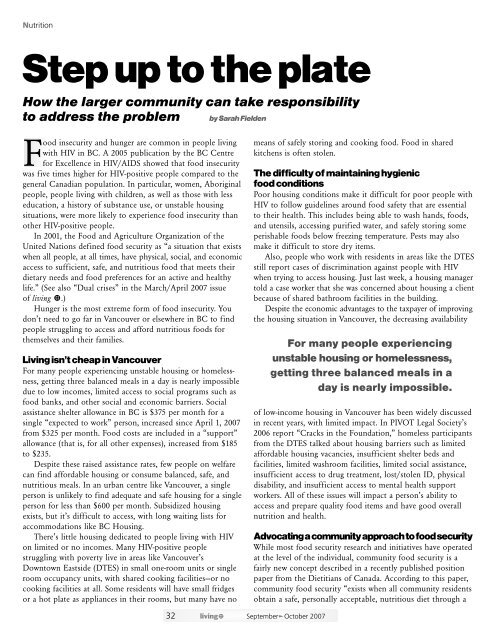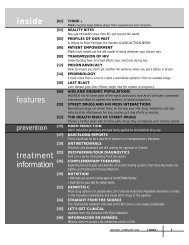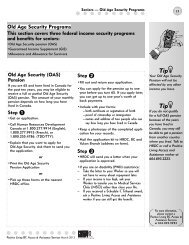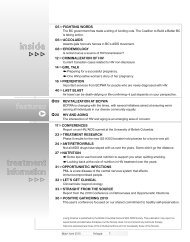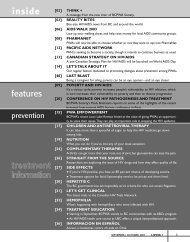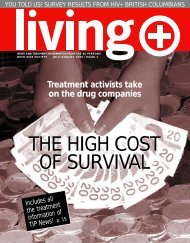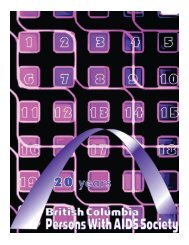iv poz mag.qxd - Positive Living BC
iv poz mag.qxd - Positive Living BC
iv poz mag.qxd - Positive Living BC
Create successful ePaper yourself
Turn your PDF publications into a flip-book with our unique Google optimized e-Paper software.
issue 50.<strong>qxd</strong>:l<strong>iv</strong> <strong>poz</strong> <strong>mag</strong>.<strong>qxd</strong> 9/3/07 4:04 PM Page 32<br />
Nutrition<br />
Step up to the plate<br />
How the larger community can take responsibility<br />
to address the problem<br />
by Sarah Fielden<br />
Food insecurity and hunger are common in people l<strong>iv</strong>ing<br />
with HIV in <strong>BC</strong>. A 2005 publication by the <strong>BC</strong> Centre<br />
for Excellence in HIV/AIDS showed that food insecurity<br />
was f<strong>iv</strong>e times higher for HIV-posit<strong>iv</strong>e people compared to the<br />
general Canadian population. In particular, women, Aboriginal<br />
people, people l<strong>iv</strong>ing with children, as well as those with less<br />
education, a history of substance use, or unstable housing<br />
situations, were more likely to experience food insecurity than<br />
other HIV-posit<strong>iv</strong>e people.<br />
In 2001, the Food and Agriculture Organization of the<br />
United Nations defined food security as “a situation that exists<br />
when all people, at all times, have physical, social, and economic<br />
access to sufficient, safe, and nutritious food that meets their<br />
dietary needs and food preferences for an act<strong>iv</strong>e and healthy<br />
life.” (See also “Dual crises” in the March/April 2007 issue<br />
of l<strong>iv</strong>ing 5.)<br />
Hunger is the most extreme form of food insecurity. You<br />
don’t need to go far in Vancouver or elsewhere in <strong>BC</strong> to find<br />
people struggling to access and afford nutritious foods for<br />
themselves and their families.<br />
L<strong>iv</strong>ing isn’t cheap in Vancouver<br />
For many people experiencing unstable housing or homelessness,<br />
getting three balanced meals in a day is nearly impossible<br />
due to low incomes, limited access to social programs such as<br />
food banks, and other social and economic barriers. Social<br />
assistance shelter allowance in <strong>BC</strong> is $375 per month for a<br />
single “expected to work” person, increased since April 1, 2007<br />
from $325 per month. Food costs are included in a “support”<br />
allowance (that is, for all other expenses), increased from $185<br />
to $235.<br />
Despite these raised assistance rates, few people on welfare<br />
can find affordable housing or consume balanced, safe, and<br />
nutritious meals. In an urban centre like Vancouver, a single<br />
person is unlikely to find adequate and safe housing for a single<br />
person for less than $600 per month. Subsidized housing<br />
exists, but it’s difficult to access, with long waiting lists for<br />
accommodations like <strong>BC</strong> Housing.<br />
There’s little housing dedicated to people l<strong>iv</strong>ing with HIV<br />
on limited or no incomes. Many HIV-posit<strong>iv</strong>e people<br />
struggling with poverty l<strong>iv</strong>e in areas like Vancouver’s<br />
Downtown Eastside (DTES) in small one-room units or single<br />
room occupancy units, with shared cooking facilities—or no<br />
cooking facilities at all. Some residents will have small fridges<br />
or a hot plate as appliances in their rooms, but many have no<br />
means of safely storing and cooking food. Food in shared<br />
kitchens is often stolen.<br />
The difficulty of maintaining hygienic<br />
food conditions<br />
Poor housing conditions make it difficult for poor people with<br />
HIV to follow guidelines around food safety that are essential<br />
to their health. This includes being able to wash hands, foods,<br />
and utensils, accessing purified water, and safely storing some<br />
perishable foods below freezing temperature. Pests may also<br />
make it difficult to store dry items.<br />
Also, people who work with residents in areas like the DTES<br />
still report cases of discrimination against people with HIV<br />
when trying to access housing. Just last week, a housing manager<br />
told a case worker that she was concerned about housing a client<br />
because of shared bathroom facilities in the building.<br />
Despite the economic advantages to the taxpayer of improving<br />
the housing situation in Vancouver, the decreasing availability<br />
For many people experiencing<br />
unstable housing or homelessness,<br />
getting three balanced meals in a<br />
day is nearly impossible.<br />
of low-income housing in Vancouver has been widely discussed<br />
in recent years, with limited impact. In PIVOT Legal Society’s<br />
2006 report “Cracks in the Foundation,” homeless participants<br />
from the DTES talked about housing barriers such as limited<br />
affordable housing vacancies, insufficient shelter beds and<br />
facilities, limited washroom facilities, limited social assistance,<br />
insufficient access to drug treatment, lost/stolen ID, physical<br />
disability, and insufficient access to mental health support<br />
workers. All of these issues will impact a person’s ability to<br />
access and prepare quality food items and have good overall<br />
nutrition and health.<br />
Advocating a community approach to food security<br />
While most food security research and initiat<strong>iv</strong>es have operated<br />
at the level of the ind<strong>iv</strong>idual, community food security is a<br />
fairly new concept described in a recently published position<br />
paper from the Dietitians of Canada. According to this paper,<br />
community food security “exists when all community residents<br />
obtain a safe, personally acceptable, nutritious diet through a<br />
32 l<strong>iv</strong>ing5 SeptemberqOctober 2007


